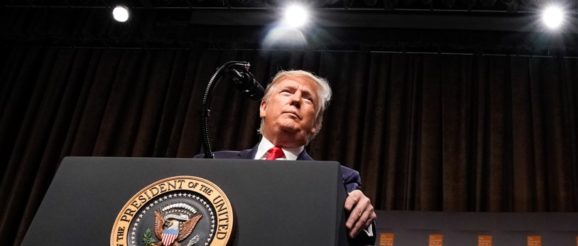Trump administration’s new AI principles seek to limit regulatory ‘overreach’ to promote innovation


The Trump administration is proposing a new set of principles for federal agencies to follow when creating regulations for artificial intelligence technologies used in the private sector.
Goals of the principles include limiting “regulatory overreach,” ensuring public participation, and promoting the development of “trustworthy” artificial intelligence, according to briefing documents provided to reporters in advance. The White House is releasing the principles Tuesday at the behest of President Donald Trump, under the American AI Initiative.
Future regulations on artificial intelligence could have an outsized impact on Amazon and Microsoft, two of the largest developers of AI technologies. Microsoft President Brad Smith has called for regulations to create common guardrails for facial recognition technology. Amazon CEO Jeff Bezos expressed a similar sentiment in off-the-cuff remarks to reporters last fall.
The White House will send the guidelines to federal agencies, which will have to show that any regulations they propose comply with the principles. Independent agencies, like the FCC, are not traditionally required to comply with these types of guiding principles when crafting regulation but the White House expects they will nonetheless.
Related: Tech experts agree it’s time to regulate artificial intelligence — if only it were that simple
The Trump administration is soliciting public comment on the proposal for the next 60 days. When public comment closes, government agencies will be asked to come up with plans for regulating AI technologies consistent with the principles handed down from the White House.
The principles are not intended to apply to government use of artificial intelligence. For example, transportation authorities creating rules for companies developing autonomous vehicles would have to take these principles into account. But the principles would not apply to government use of AI technologies, such as U.S. Customs and Border Protection implementing facial recognition screening at ports of entry.
The White House’s wariness of regulatory overreach is noteworthy because AI is a largely unregulated new frontier. But the administration is concerned about early attempts by local regulators to rein in the new technology.
“The examples in the U.S. today at the state and local level are examples of overregulation, which you want to avoid at the national level,” an administration official told reporters during a briefing. “When particular states or localities make decisions like banning facial recognition across the board, you end up in tricky situations where civil servants may be breaking the law when they try to open their government-issued phones.”
San Francisco and other cities have banned city departments from using facial regulation software amid an ongoing debate over the accuracy of the technology and the civil rights issues it raises.
President Donald Trump launched the American AI Initiative via executive order a year ago to “to preserve America’s advantage in collaboration with our international partners and allies,” the White House said at the time.
China and the European Union are both pushing ahead with multibillion-dollar AI research and development programs. In response, the federal government formed an advisory panel on AI R&D, and a commission focusing on AI’s national security implications, with Amazon’s Andy Jassy and Microsoft’s Eric Horvitz among its members.
“The principles also send a message to the international community,” the Trump administration says in a press release. “Europe and our allies should avoid heavy handed innovation-killing models, and instead consider a similar regulatory approach. The best way to counter authoritarian uses of AI is to make sure America and our international partners remain the global hubs of innovation, shaping the evolution of technology in a manner consistent with our common values.”
